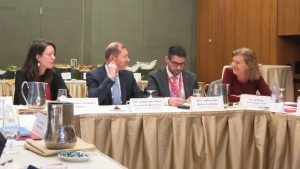On January 29, 2020, Watchlist on Children and Armed Conflict (‘Watchlist’) held its annual children and armed conflict workshop, jointly hosted with Princeton University’s Liechtenstein Institute on Self-Determination (LISD). This is the sixth such policy workshop co-sponsored by LISD and Watchlist since 2013.
The event brought together representatives from UN Security Council Members, non-Council Member States, the Office of the Special Representative of the Secretary-General for Children and Armed Conflict (OSRSG-CAAC), UN agencies, and civil society to discuss challenges and opportunities to strengthen implementation of the UN’s Children and Armed Conflict (CAC) agenda. SRSG-CAAC Virginia Gamba opened the workshop by discussing progress over the past year and areas of continued concern for children in armed conflict.
The workshop provided a unique opportunity for candid discussions about the agenda among diverse stakeholders and served as an induction of sorts on CAC for incoming Security Council members. The workshop featured

Photo credit: Watchlist 2020.
presentations from a number of expert panelists. These include Ambassador Marc Pecsteen de Buytswerve, who reflected on Belgium’s first year as Chair of the Security Council Working Group on Children and Armed Conflict, and Canada’s Ambassador and Chair of the Group of Friends on Children and Armed Conflict Richard Arbeiter, who highlighted the role of non-Council Member States in strengthening the response to grave violations committed against children.
Additional workshop sessions focused on ongoing challenges implementing the CAC agenda on the ground, as well as emerging issues with implications for the protection of children in armed conflict. These include the negative impacts on children’s rights of efforts to counter terrorism and violent extremism, the military detention of children for their real or perceived association with armed groups or on national security-related charges, and escalating attacks on schools in the Sahel.
During the wrap-up session, participants developed a series of recommendations for translating the workshop discussions into concrete actions to end, prevent, and respond to grave violations against children in armed conflict.



